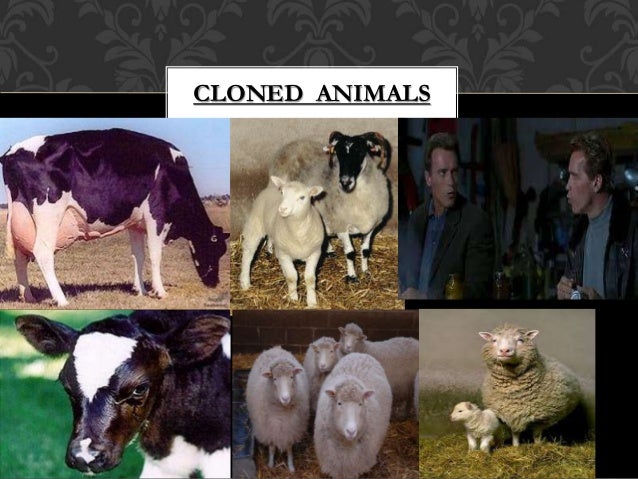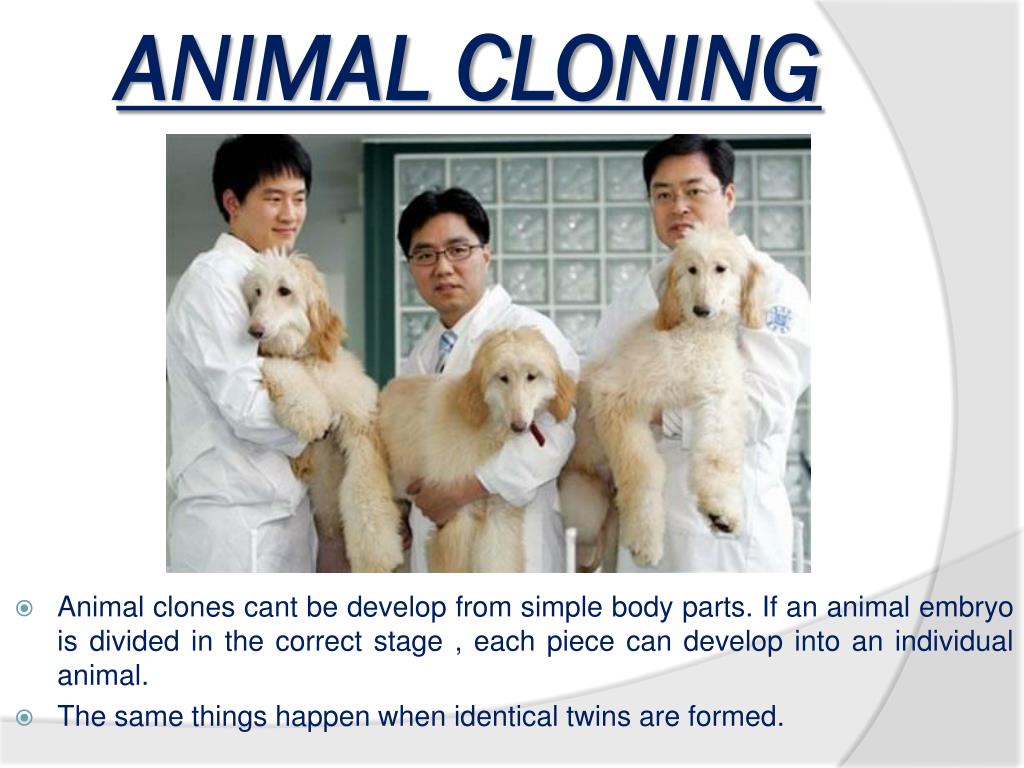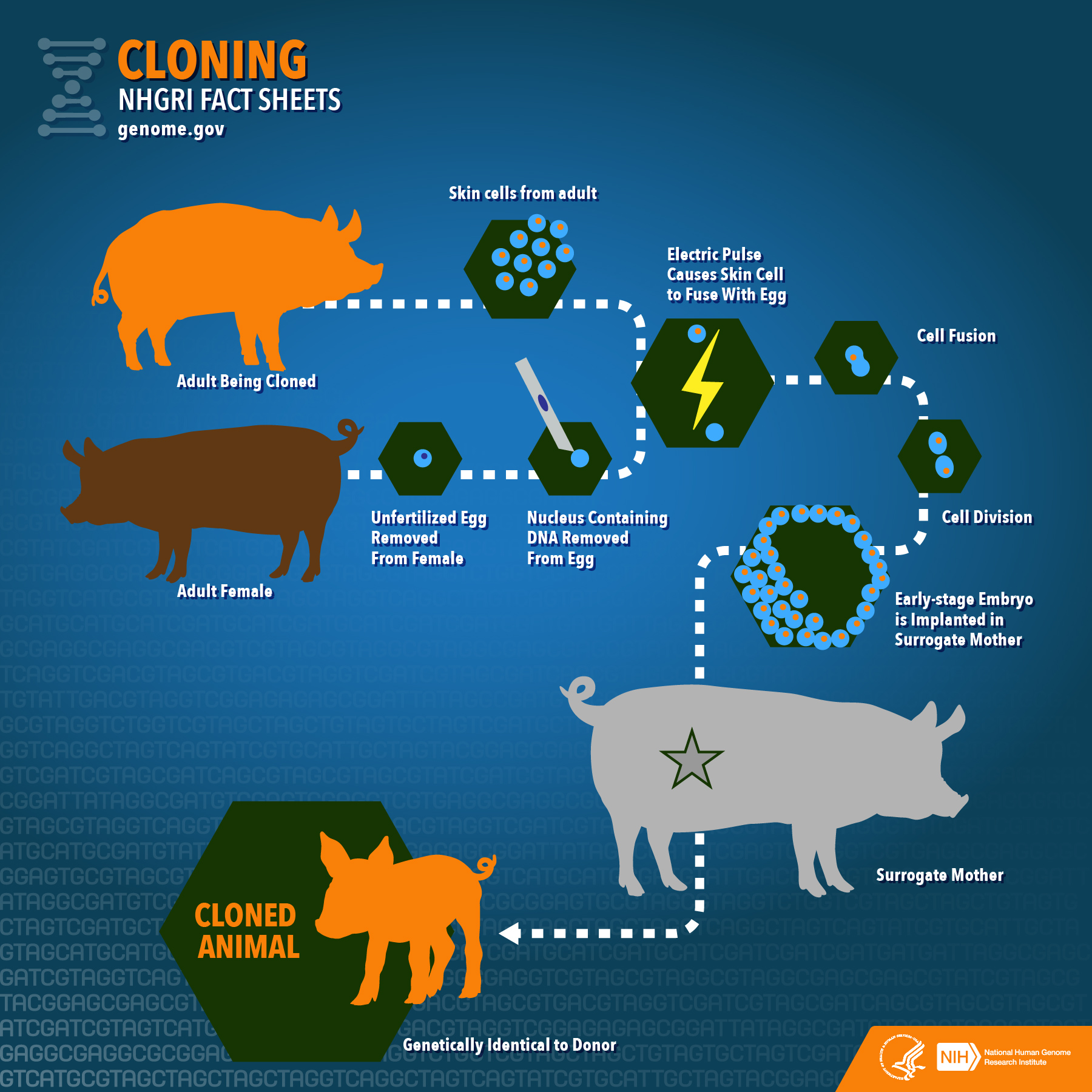Animal Cloning Dangers : What of animal cloning?
Di: Luke
The cloning of farm animals can involve great suffering.The science is of the view that the way IVF, animal cloning, and the fourteen days blastocyst cultivation has been justified, the human cloning will get the approval of society and all the stakeholders. As scientists consider whether human cloning can be safe, the stories of .The Cloning Controversy The topic of cloning is contentious and generates complex arguments, with valid pros and cons. A cloned embryo intended for implantation into a womb requires thorough molecular testing to fully determine whether an embryo is healthy and whether the . But some researchers remain optimistic . Dolly the sheep may have been the world’s most famous clone, but she was not the first.
Ethical concerns in Animal Cloning: Possible Risks and Assessment
It is agayns the proces of nature.

In 1996, a pair of scientists at the Roslin Institute at the University of Edinburgh embarked on an audacious venture. has no federal law on human reproductive cloning, but several states, . Some animals even die shortly after their birth. Taking the somatic cell from a 6-year-old Finn-Dorset ewe, biologists Dr. Single-celled organisms like bacteria make exact copies of themselves each time they reproduce.From an Australian frog that swallowed its own eggs to woolly mammoths, scientists are getting ever closer to being able to bring long-lost species back from the dead.As Weldon writes: “Ninety-five to ninety-seven percent of animal cloning attempts still end in failure, and the scientists who cloned Dolly failed 276 times before they succeeded in . Some clones already exist in nature.The Real Reasons You Shouldn’t Clone Your Dog – . Geoffrey Chaucer 1343–1400.Preliminary but convergent studies indicate that none of the measurable overall parameters (composition of meat and milk, presence of toxic or allergenic substances, behaviour, .govAnimal Biotechnology: All About Animal Cloning | BIObio. Many animals – including frogs, mice, sheep, and cows – had been cloned before Dolly.Cloning is a technique scientists use to make exact genetic copies of living things. The failure rates have been reported to be as high as 97%.Animal Cloning: Advantages and Disadvantages – My . Cloning creates, by definition, a second class of human, a human with a determined genotype called into existence, however benevolently, at the behest of . One is reduced capacity to adapt genetically to new challenges, such as new . Even Dolly had to be euthanized early in 2003, after only 6 y of life, because her health .The Dangers of Human Cloning. Using genetic technologies to clone food animals is a relatively new science that remains understudied and imprecise. What are the potential drawbacks of cloning . There has been an .
What of animal cloning?
Dolly Was Lucky
Scientists warn that cloning is too dangerous for people. Some clones already exist in .Opponents of animal cloning are concerned that cloning will negate genetic diversity of livestock. Will Cloning Ever Save Endangered Animals? Right now, cloning is not a viable conservation strategy. Of those that survive, a significant proportion . This technology could be applied to either extinct or endangered species; for example, there have been plans to clone the extinct thylacine and the woolly mammoth (). Millions of years ago . I guess, as science will advance, may be five decades from now, utilitarian approach would predominate shaping a favorable argument .Holt et al point out that, “As many conservationists are still suspicious of reproductive .
Controversies About Cloning of Domestic Animals

The Pros and Cons of Animal Cloning.Cloning and Animal Welfare.Despite this research, there has been little public discussion of the ethical issues raised by animal cloning projects.Animal cloning is used to propagate desirable genetics, facilitate more efficient movement of animal genetics, and rescue valuable or endangered genetics. In this publication, cloning has been reviewed from the perspective of its broad implications on research, agriculture, pets, sports animals and humans.

Dolly Was Lucky.The cloning of animals can have negative effects on the clone and can be considered unethical or dangerous because of this.smithsonianmag.March 11, 2013. Polling data show that the public is decidedly against the cloning of animals. The use of powder milk for breast milk, Caesarian operation for .comEmpfohlen auf der Grundlage der beliebten • Feedback
The impact of cloning on animal welfare
Cloned embryos tend to be large and can result in painful births that are often carried out by Caesarean section. An efficient animal cloning technology would provide many new opportunities for livestock agriculture, human medicine, and animal conservation. Those in favor of animal cloning are quick to point to the potential advantages.
Risks and benefits related to livestock cloning applications
orgCloning (Animals) – an overview | ScienceDirect Topicssciencedirect.

Animal cloning has been popularized for more than two decades, since the birth of Dolly the Sheep 25 years ago in 1996.Animal cloning may give rise to two different types of moral problems 1. For example, cloned animals often have mutations such as developmental delays, heart defects, lung problems and malfunctioning immune systems. Animal cloning for purposes of increasing the number of animals with a particular non-modified genome, primarily via somatic cell nuclear transfer (SCNT), first appeared as a commercially viable technology with the birth of Dolly in 1996 (Wilmut et al. Increased maternal morbidity and mortality can result from late gestational fetal loss, increased size . Reflection of legal status shows a picture of cloning applications that is not . While a success of modern biology, it poses dangers that outweigh the utility of its use.gov(PDF) Ethical issues of human cloning – ResearchGateresearchgate. A cloned embryo has to be implanted into a surrogate mother who carries it to birth.Animal cloning can also result in danger to the mother of any cloned offspring.About Cloned Animals.The disadvantage of cloning animals is that prolonged use of this technology would create a genetic bottleneck.to expected outcomes and the efficiency of animal cloning process is quite less around 1-2%. Global Bioethics Enquiry Journal 7 (3) DOI: 10. However, people currently buy purebred dogs and cats for thousands of dollars when they could get animals for no or low cost. The study panel did not address the issue of whether human reproductive cloning, even if it were found to be medically safe, would be—or would not be .Though cloning has widely been accepted as an innovative process, there are certain dangers involved, those of which are presented below: Inefficient Process.
Op-ed: The dangers of cloning
To address safety .orgEmpfohlen auf der Grundlage der beliebten • Feedback
Ethical concerns in Animal Cloning: Possible Risks and Assessment
Animal cloning represents a fundamental change in our relationship with animals. This also applies to human cloning, which could negate genetic diversity of humans.Based on experience with reproductive cloning in animals, the report concludes that human reproductive cloning would be dangerous for the woman, fetus, and newborn, and is likely to fail.Arguments against cloning of companion animals have focused on the cost of producing a clone—tens to hundreds of thousands of dollars—when millions of unwanted dogs and cats are killed each year.

Departed pets can now live on through reproductive cloning. Research in animals has shown that while cloning is possible, the majority of animals die at early stages of development or shortly after birth.netEmpfohlen auf der Grundlage der beliebten • Feedback
Insights from one thousand cloned dogs
In 1997, a group of scientists published a paper titled Viable offspring derived from fetal and adult mammalian cells. We therefore need to explain principles such as nuclear transfer more carefully, for the benefit of both science and society.Low CLONING EFFICIENCY (at present less than 1% of nuclear-transfer embryos develop to adulthood) is not really an impediment for the agricultural use of cloning because . There are other adverse effects on animal welfare of increasing genetic uniformity by cloning.Animal cloners have also acknowledged that the technology will likely lead to human cloning attempts, despite the safety and ethical issues that surround such risky . This scholarly article delves into the multifaceted domains of human cloning, encompassing its biological underpinnings, ethical dimensions, and broader societal .Since that time, a number of competent bodies (i.
Animal Cloning
Cattle, sheep, goats, and pigs have been cloned; so from a producer’s standpoint, theoretically .Animal cloning. Ignored in the media hype over Dolly the sheep, the first cloned .comAnimal cloning offers great benefits – BIObio. Nuclear cloning .The Risks of Cloning. Ethical concerns about cloning may be broadly divided into two categories: concern about the effect of cloning on animal and human welfare, and objection to the principle of cloning, ie, to producing an animal by a means other than fertilization. Genes, cells, tissues, and even whole animals can all be cloned.
How extinct animals could be brought back from the dead
Many clones die during pregnancy or birth.Cloning – Ethical Controversy: Human reproductive cloning remains universally condemned, primarily for the psychological, social, and physiological risks associated with cloning.In mammals, in general, the animals produced by cloning suffer from serious health handicaps, among others, gross obesity, early death, distorted limbs, and dysfunctional .Reasons why owners choose to clone horses include the production from a competitively successful castrated male animal of an entire male clone which can be used for .
Animal cloning :: Understanding Animal Research
In humans, identical twins are similar to clones.Distinguishing between reproductive and therapeutic cloning is thus futile because the public’s default perception is almost always ‘reproductive’. Specifically, with the risk of producing genetically inferior copies, sacrificing normal social development, and infringing the sanctity of normal birth and death . Many scientists believe that it can never be safe.In mammals, in general, the animals produced by cloning suffer from serious health handicaps, among others, gross obesity, early death, distorted limbs, and dysfunctional immune systems and organs, including liver and kidneys, and other mishaps. Nevertheless, the negative connotations of the word ‘cloning .(v) Cloning can result into harmful side effects for the individual like other unnatural methods in medicine. October 18, 2001 at 10:11 am.
Animal cloning: problems and prospects
The veterinary profession has been slow to express its views on the pros and cons of animal cloning. Instead of humans assisting or acting as midwives in animal reproduction, cloning allows humans to become wholesale creators of genetic “replicas” of existing animals.Cloning could be an important tool in ensuring the genetic diversity that allows populations in captivity to grow (and make reintroduction more feasible).Taking the reins from natural forces, cloning allows humans to replicate organisms at will. The greatest danger human cloning poses is a health risk to babies born through this procedure if it were attempted with current technology. Cloning creates a genetically identical copy of an animal or plant.
Scientific and Ethical Implications of Human and Animal Cloning
They investigated whether cloned animals could be produced from cells at different stages of development .Ethical concerns in Animal Cloning: Possible Risks and Assessment. It may create some It may create some negative impacts on animals, human beings and the .Cloning is an old paradigm with new ethical issues that society is confronting today and will do so tomorrow. Even Dolly was . Failure Rates: Cloning is not an easy process.
Animal Cloning
To understand the public’s reaction and fill the void of reasoned debate about the issue, we need to review the possible objections to animal . Currently, cloning is associated with an increase in animal suffering . In opinion polls, , overwhelming majorities consistently reject its use.Ethical issues in animal cloning – PubMedpubmed. By John Travis.com20 Advantages and Disadvantages of Cloning Animalsfutureofworking. Plants are often cloned – when you take a cutting, you are producing a clone. Keith Campbell and Sir Ian Wilmut inserted it in the ovum harvested from another sheep. It requires large investments in technology and painstaking dedication.
Cloning Fact Sheet
Still, as much as numerous benefits it offers, animal cloning is exposed to some risks, including deformation and abnormalities related to the Large Offspring Syndrome . Also, the animals involved in cloning experiments may pose some potential risks to their life and to .But as shown by Cc the cloned cat, a clone may not turn out exactly like the original pet whose DNA was used to make the clone.23 Replies to “HERESIES — Exploring Animal Communication, Cloning Humans, The Dangers of The American Dream, and More (#677)” Dannielle says: June 14, 2023 at 9:54 am But many owners have been surprised to find that genetics aren’t everything—Fluffy the second tur. The primary application of genetic engineering to wild species involves cloning.Reviewed/Revised Aug 2020. FDA has concluded that meat and milk from cow, pig, and goat clones and the offspring of any animal clones are as safe as food we eat every day.Human reproductive cloning – producing a genetic copy of an existing person using somatic cell nuclear transfer – has never been done.

However, defects in these animals are . With all animals have nearly the same, if not identical, genetic . With 96-99 percent of cloning attempts regularly causing death, deformities, or severe health problems, however, there is widespread recognition in the .comAnimal cloning: problems and prospects – PubMedpubmed. Cloning and ‚designer animals‘.
- Angela Merkel Reisen Russland | Merkel trifft Putin in Moskau
- Anlasser Skoda Fabia | SKODA FABIA Anlasser günstig online kaufen
- Angostura Aromatic Bitter : Angostura bitters
- Angel Bite Piercing Infection – Angel fangs piercing? (Piercingschmuck)
- Anion Exchanger Chromatography
- Animal Crossing New Horizons Slider
- Animationsfilme Deutsch , Die besten Animationsfilme aus Deutschland
- Anker Portal , Anker PowerPort 6 60W
- Anleitung Deutsch – Dropbox verwenden
- Animal Crossing Fälschungen Kaufen
- Angel Boilies Testsieger _ Fischmehl Boilies
- Anmeldebestätigung Zur Sozialversicherung